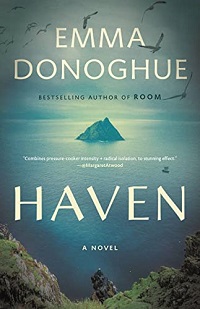In the seventh century, Artt, a scholar-priest guided by a dream, asks two monks to join him on a pilgrimage to an empty isle “less tainted by the world’s breath.” Excited at achieving a greater life purpose, the elderly Cormac, a talented storyteller and mason, agrees to go, as does Trian, a lanky, adventurous younger man.
From the days-long boat journey through their mission to establish an island settlement and worship God appropriately, their work is arduous. Donoghue’s (The Pull of the Stars, 2020) prose glimmers with images of the pristine natural world, including many varieties of sea birds, but as Artt’s sanctimonious piety increasingly challenges common sense, Cormac and Trian wonder if their vows of obedience will doom them.
As always, Donoghue extracts realistic emotions from characters interacting within close quarters and delicately explores the demands of faith. This evocative historical novel also works as a cautionary tale about the dangers of religious control.
I wrote this review for the June 1st issue of Booklist. Haven was published by Little, Brown (US) last Tuesday, August 23rd. Isn't the cover art gorgeous? I'm a fan of Emma Donoghue's work, and my favorites are Frog Music and The Wonder, the latter of which is soon to be available as a Netflix film starring Florence Pugh.
For additional perspectives (which are also positive recommendations), please check out Kristen McDermott's review of Haven for the Historical Novels Review as well as Ron Charles's review for the Washington Post. I always enjoy seeing other reviewers' takes on novels I've read myself. Charles's description of Haven as "Room with a view" is an inspired, smart observation that's remarkably accurate!
Emma Donoghue was also interviewed by Margaret Skea for the Historical Novels Review's August issue, and you can read that piece here.






No comments:
Post a Comment